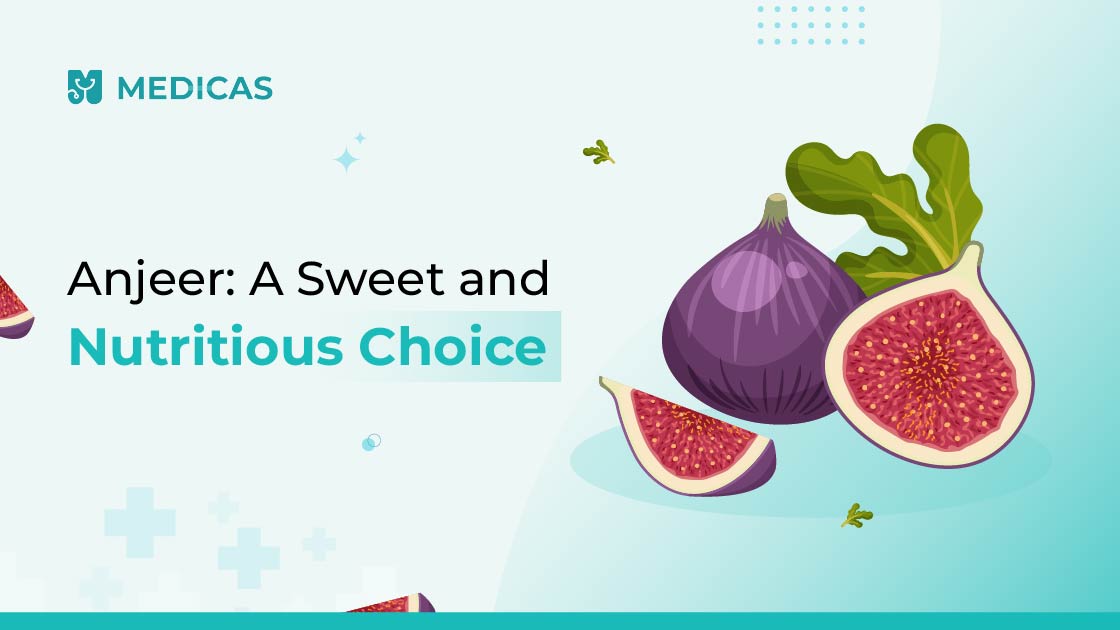Living with diabetes often means avoiding sweets and fruits, but anjeer, or fig, offers a naturally sweet and nutritious solution. Rich in fiber and essential minerals, anjeer can be a healthy, diabetes-friendly snack when eaten in moderation. But is anjeer good for diabetes in all cases? How much should you eat? And is dried anjeer different from fresh?
This article provides a comprehensive breakdown so that you can enjoy your snacks with confidence and clarity.
Is Anjeer Good for Diabetic Patients?
Nutritional Profile of Anjeer
Anjeer, whether fresh or dried, is packed with nutrients like vitamins, minerals, fibre, and natural sugars, making it an excellent health choice.
Fresh Anjeer vs. Dried Anjeer
| Nutrients (per 100g) | Fresh Anjeer | Dried Anjeer |
| Water | 79.9–88.1% | 12.9–25.9% |
| Calories | ~37 kcal | 308.5–332.7 kcal |
| Carbohydrates | 7.6–20 g | 65.2–73.5 g |
| Fibre | 2.1–2.2 g | 3.6–69.4 g |
| Protein | 0.5–1.3 g | 1.8–8.6 g |
| Fat | 0.2–0.5 g | 0.1–2.7 g |
Key Nutrients:
- It mainly contains glucose, followed by fructose, and a small amount of sucrose.
- Vitamins:
- Vitamin B6 – 8% of the daily need
- Vitamin B5 – 6%
- Vitamin B1 (Thiamine) – 5%
- Vitamin K – 4%
- Others in small amounts: Vitamin A, B2, B3, C, Folate
- Minerals:
- Potassium – 232 mg
- Calcium – 35 mg
- Magnesium – 17 mg
- Calcium, Iron, Zinc, Manganese – for immunity
Extra Benefits:
Rich in antioxidants and phytonutrients, Anjeer helps regulate blood sugar levels and insulin function, and protects cells from damage.
Also Read: Exploring the Link Between Moldy Toilets and Diabetes: Fact or Fiction?
Glycemic Index of Anjeer and Its Importance
Anjeer has a moderate glycemic index of around 51, which means it raises blood sugar levels more slowly compared to high-GI foods, making it a healthier alternative to sugary snacks.
Interestingly, studies have found that fig extracts can further reduce the GI of foods by up to 25%, enhancing their blood sugar management benefits. This is why anjeer is considered a smart choice for diabetes, offering natural sweetness when consumed in moderation.
Is Dried Anjeer Good for Diabetes?
Many people prefer dried anjeer (dry figs) for their long shelf life and intense flavor. But are dry figs good for diabetics?
Dried anjeer is packed with powerful plant compounds, such as phenolic acids and flavonoids, that help fight inflammation and support blood sugar control. The high fiber in dry figs also helps prevent sudden sugar spikes. Darker varieties offer even more antioxidants.
However, it’s important to check the label before buying. Sometimes, dried anjeer is processed with added sugar to enhance taste and shelf life.
This can significantly increase its glycemic load and reduce its suitability for diabetic patients. Always opt for unsweetened, naturally sun-dried figs whenever possible, and consult your nutritionist or doctor before including packaged varieties in your diet.
Health Benefits of Anjeer for Diabetes
Anjeer Benefits for Blood Sugar Control
Emerging research highlights anjeer as a natural aid for managing blood sugar. A study found that fig improved insulin sensitivity and glucose levels in obese mice, linked to its abscisic acid content. Anjeer may also reduce cholesterol, prevent artery buildup, and support heart health, making it valuable in managing diabetes and metabolic syndrome.
How to Eat Anjeer for Diabetes Safely
Best Time to Eat Anjeer for Diabetic Patients
The best time to consume anjeer fruit for diabetics is:
- In the morning on an empty stomach (soaked overnight)
- As a mid-morning snack between breakfast and lunch
Avoid eating it late at night or after a heavy meal to prevent sugar overload.
Soaked vs. Raw Anjeer: What’s Better?
Soaking anjeer overnight softens the fruit, breaks down some of the sugars, and increases the availability of soluble fibre, making it gentler on blood sugar.
Portion Control and Frequency Tips
Limit to 2–3 fresh or soaked figs (or 1–2 small dried figs) per sitting, no more than once daily. Avoid mixing it with other sweet fruits at the same time. Always pair it with a source of protein or healthy fat, such as a few almonds, to further reduce sugar absorption.
Also Read: How Pilates Can Benefit People With Diabetes-The Ultimate Guide!
Precautions and Who Should Avoid Anjeer
Is Anjeer Safe for Diabetic Patients on Medication?
Generally, yes. But if you’re on:
- Insulin
- Other glucose-lowering medications
You must be cautious, as the combined effect may lead to hypoglycaemia (low blood sugar). Discuss any dietary changes with your doctor during an online consultation before adding anjeer regularly.
Possible Side Effects of Overconsumption
Too much anjeer may cause:
- A sudden sugar spike
- Loose motions (due to high fibre)
- Bloating or gas
- Weight gain over time
Anjeer is good for your health, but moderation is key.
Natural Alternatives to Anjeer for Diabetes
Other Fruits with Low Glycemic Index
If you’re not fond of anjeer or want to mix things up, try other low-GI foods:
Comparing Anjeer with Dates, Raisins, and Berries
- Dates: GI 42.8–74.6; higher sugar content—limit to 1 small date.
- Raisins: GI 66; easy to overeat, so portion carefully.
- Berries: GI <70 (low), except blueberries (76)
Anjeer ranks better than raisins or dates for people with diabetes. But berries may be slightly better due to their low sugar content and high antioxidant levels.
Also Read: Is Gauva Good for Diabetes
Online Medical Help for Diabetic Diet Planning
When to Consult a Doctor for a Diabetic Diet?
Seek advice if you notice persistent post‑meal hyperglycaemia or hypoglycaemia, or when adding new foods like anjeer that may alter your insulin or medication requirements.
How Online Medical Appointments Help in Diabetes Care
With busy schedules and limited mobility, many patients skip regular follow-ups. But with online doctor consultation, you can:
- Discuss your meal plans
- Review lab test reports
- Adjust your medicine dosages
- Ask about diet-friendly options like anjeer benefits for diabetes
And you can do all this from the comfort of your home. If you need personlised guidance on your diet, customised to your lifestyle, you can reach out to me via Medicas.
Where to Get Online Advice on Diabetic Nutrition
Platforms like Medicas provide nutritionist consultations and let you book lab tests for regular glucose profiling. You can also book appointments with a diabetes educator to create a personalised meal plan that includes fruits like anjeer and home remedies.
Conclusion
Is anjeer good for health, especially for those with diabetes? The answer is a confident yes — if eaten correctly. Always follow your doctor’s advice, monitor your sugar levels, and make mindful choices.
Need expert guidance on managing your diabetes? Book an appointment with Medicas’ nutrition experts or get an online doctor consultation today. Your health deserves expert care — anytime, anywhere.
Frequently Asked Question
- Can anjeer be part of a diabetic diet plan?
Yes, anjeer can be included in a diabetic diet in moderation, preferably soaked and consumed in small portions.
- Where can I get online medical advice for diabetes management?
You can use Medicas to consult expert diabetologists and nutritionists through online doctor consultation from the comfort of your home.
- How do I book an online appointment for diabetic nutrition?
It’s simple. Visit Medicas’ website and click “Book an appointment.” Choose a date, time, and connect with a certified expert.
- What do doctors say about eating anjeer for diabetic patients?
- Most doctors agree that anjeer is safe for diabetes in small portions, due to its low glycemic index and high fiber content. However, each patient is different, so medical advice is always recommended.
Related Blogs
Disclaimer
Medical Advice: The information provided in this blog post is for educational purposes only and should not be considered as a substitute for professional medical advice, diagnosis, or treatment. Always consult with a qualified healthcare professional for personalized guidance regarding your specific medical condition.
Accuracy of Information: While we strive to provide accurate and up-to-date information, the field of medicine and viral fevers is constantly evolving. The content in this blog post may not reflect the most current research or medical guidelines. Therefore, it is advisable to cross-check any information provided with reliable sources or consult a healthcare professional.
Individual Variations: The symptoms, causes, treatment options, and preventive measures discussed in this blog post are general in nature and may not apply to everyone. It is important to remember that each individual’s situation is unique, and personalized medical advice should be sought when making healthcare decisions.
External Links: This blog post may contain links to external websites or resources for additional information. However, we do not endorse or have control over the content of these third-party websites. Accessing these links is done at your own risk, and we are not responsible for any consequences or damages that may arise from visiting these external sources.
Results May Vary: The effectiveness of treatment options or preventive measures mentioned in this blog post may vary from person to person. What works for one individual may not work the same way for another. It is essential to consult with a healthcare professional for personalized advice tailored to your specific needs.

Dr. Sweekruti Jena is an Endocrinologist and Diabetologist based in Bhubaneswar, Odisha, with 6 years of clinical experience. She holds an MBBS (Hons.), an MD in Internal Medicine, and a DM in Endocrinology. Her areas of expertise include diabetes, thyroid disorders, obesity, growth and puberty issues, and calcium-bone metabolism disorders. Dr. Jena is also a recipient of the TYSA Award (Runner-up) by the Endocrine Society of India.


